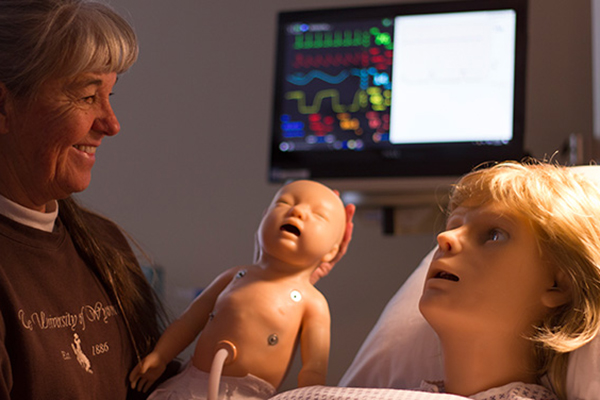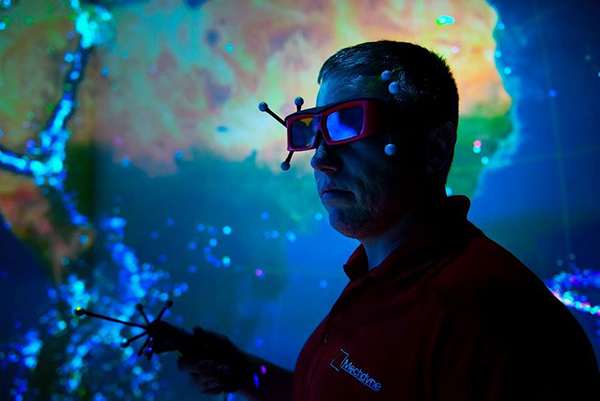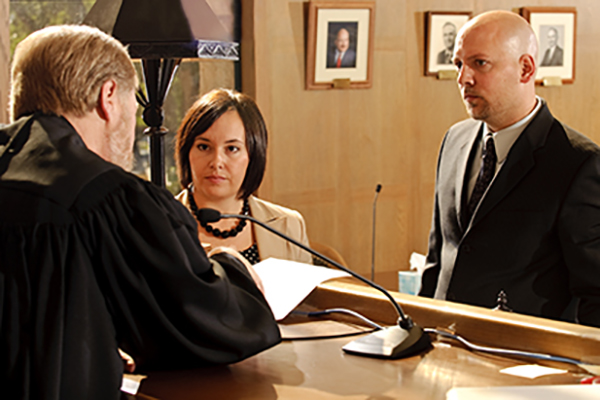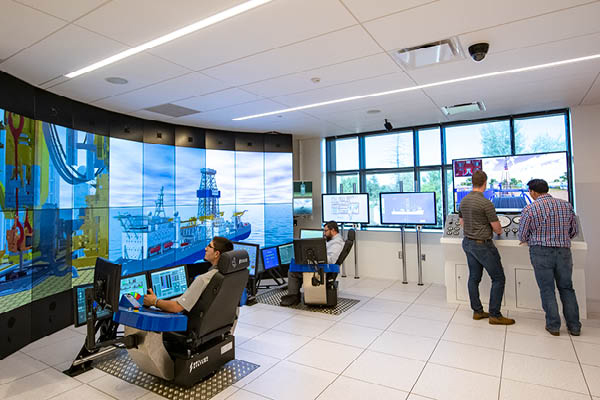How Industries Are Directly Engaging with UW Students Through Experiential Learning Centers
The University of Wyoming takes pride in its commitment to providing experiential learning opportunities for students. Through simulation centers, UW offers invaluable hands-on experiences tailored to the diverse degree paths within numerous colleges and departments. These immersive opportunities not only enhance academic knowledge but also equip students with the practical skills essential for their future success and that of their employers. In addition, these centers open a wealth of industry engagement opportunities through financial and advisory support of the centers, field training experience, and recruitment networks for UW’s best and brightest scholars.

The Fay Whitney School of Nursing Clinical Simulation Center
The Clinical Simulation Center at the Fay W. Whitney School of Nursing houses a wide variety of activities and resources for nursing students. The center includes skill lab simulations, patient rooms, an ICU, exam rooms, and other simulations including wilderness and even a “psych sim.” The center holds numerous low-fidelity and high-fidelity manikens that can talk, sweat, bleed, and more.
The center has partnered with Wyoming hospitals including Ivinson Memorial to provide a realistic simulation where students can train and gain confidence in a safe and controlled environment.

UW School of Energy Resources Shell 3D Visualization Center
The Shell 3D Visualization research laboratory—the only four-walled Cave Automatic Virtual Environment and 3D visualization laboratory in Wyoming—enables scientists and engineers to visualize and interact with highly complex data sets. Designed, engineered, and integrated by Mechdyne, one of the world’s leading providers of innovative visual information technologies, the laboratory combines high-resolution stereoscopic projections and 3-D computer graphics to create a virtual environment where researchers can analyze, interpret, and share a wide variety of spatially related data.
This lab can be used by students and researchers across the disciplines. For example, thanks to support from the Wyoming Innovation Partnership, SER’s Lead Developer Kyle Summerfield and his team created the virtual surface mining training program using ground-based LiDAR scans of Black Thunder coal mine. This application provides critical training for students entering a career in mining, allowing them to learn in an augmented reality prior to stepping into a mine. The project was a partnership with the Mine Safety and Health Administration and Gillette College. Over 6,000 students have utilized this program to date. Last May, Summerfield also hosted an extensive three-day introduction to educational program development for thirty-five faculty and staff from each of Wyoming’s seven community colleges representing disciplines including administration, chemistry, nursing, and criminal justice.

College of Law Student Legal Clinics
The UW College of Law offers experiential learning opportunities for students through the Student Legal Clinics, which allows UW law students to have an array of real-world experiences within the many disciplines of practicing law. Unlike other centers, these clinics are not simulations but rather real caseloads. Students work with approved College of Law faculty and real clients.
A full-time faculty member directly supervises each clinical program. There are no adjunct or staff members between the faculty supervisors and student interns. A student director is appointed for each program to help the faculty supervisor administer the program, and the faculty supervisor is professionally responsible for the students. Therefore, particular emphasis is placed on professional responsibility to the client, the profession, and the community.
The center connects with a network of law firms and engages industry to create the six clinics that are offered: Civil Legal Services, Defend Aid, Family and Child Legal Advocacy, International Human Rights, Prosecution Assistance Program, and Energy, Environmental, and Natural Resources Law.

College of Engineering and Physical Sciences Drilling and Completions Simulator Lab
UW’s Drilling and Completions Simulator is the largest most technologically advanced center in North America and is training petroleum engineers of the future. Made possible with initial support from 3t Drilling Systems and WPX Energy, this laboratory is used to train future talent for the oil and gas industry using cutting-edge simulator technology and immersive training techniques such as virtual reality. The lab develops new innovative solutions for the global energy sector through simulation, visualization, modeling, consulting, and training.
The Drilling and Completions Simulator Lab allows students to learn how to operate complex drilling, well control, and well servicing equipment to prepare them for the workplace. Students experience all the movement, sounds, and operations of real offshore and onshore rigs but in a safe environment. The center is described as impressive by companies. Industry leaders often visit campus and speak directly to UW students about the real-life scenarios and the importance of having a simulation center to practice these skills.

College of Engineering and Physical Sciences Process Control Lab
The Process Control Lab provides UW students hands-on experience with a broad range of industry-leading technologies. The lab, which opened in late 2021, was made possible through a generous contribution from Genesis Alkali, which operates the world’s largest natural soda ash mine and production site near Green River, Wyoming.
The program was established in 2019, when Genesis Alkali noticed a training gap and turned to UW to help find a solution. The demand for qualified process control employees outpaces the availability. Typically, process control is an area in which Genesis Alkali prefers to hire experienced people but, because of the shortage, the company wanted to take a different approach and donated $100,000 in seed funding to establish a minor in process control and a minor in instrumentation in the College of Engineering and Physical Sciences.

College of Engineering and Physical Sciences Construction Research and Innovation Lab
The Construction Research and Innovation Lab is housed within the College of Engineering and Physical Sciences. The lab focuses on the areas of remote sensing and image interpretation, automation in construction, and wearable technology. The lab also supports research within other information technology applications for construction engineering and management, sustainability, infrastructure asset management, safety, and transportation.
Graduates from the program secure roles in construction sectors including residential, commercial, institutional, industrial, environmental, and agricultural. Courses allow students to obtain various industry recognized certificates as part of their degree experience, including but not limited to OSHA, LEED, DBIA, and the Associate Constructor Certificate.

College of Business Center for Professional Selling
Sales competitions provide an excellent opportunity for students interested in pursuing careers in sales. These competitions allow students to further develop their communication and presentation skills in a highly competitive environment. Furthermore, they provide great networking and experiential learning opportunities. Corporate partners who sponsor these events have the opportunity to meaningfully contribute to students’ sales education while building relationships and assessing talent.
Companies provide financial support for prizes and can also serve as judges for these simulation experiences that provide a real selling scenario, encouraging them to practice the skills learned in the classroom. Students are often using actual cases from industry.
Companies such as Sherwin-Williams and EMIT Technologies have partnered with the center in support of sales competitions. Industry leaders spend time interacting with students, role-playing as buyers, and provided feedback and grading.
